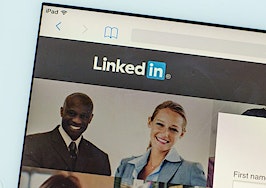- Using your personal Facebook profile for business is risky and causes you to miss out on the numerous benefits Facebook provides for business pages.
- Be cautious when having someone else set up your business page for you.
- Don’t leave a trail of abandoned Facebook pages for potential clients to judge your social media savvy by.
The main function of your Facebook page should be to help you stay top-of-mind with your sphere — a way to nurture that all-important repeat and referral business. It’s critical that you avoid making the following mistakes:
Using your personal Facebook page for business
OK, a lot of agents do it — why shouldn’t you?
For starters, you agreed not to when you created your personal page! Facebook is pretty clear about the consequences too: “If you’re using your account to represent something other than yourself, you could permanently lose access to your account if you don’t convert it to a (business) page.”
“Permanently lose access to your account …” — just imagine if Facebook shuts down your page — there go all your followers, your photos, your history and all your efforts. Don’t fool yourself into thinking it can’t happen either.
The Facebook profile you use for your business is meant to generate repeat and referral business. Is your friend from kindergarten who lives three states away really going to buy a home or refer someone in your market? Keep personal relationships personal.
[Tweet “Keep personal relationships personal.”]
There are also numerous benefits that a business page has over a personal profile:
Data
Facebook Insights provides you with a wealth of information about the people who have liked your page — what they’re clicking on, their interests, age, gender, location and when they’re active on Facebook. This information is invaluable for future targeting.
Advertising
A business page allows you to advertise your listings to a hyper-targeted audience, based on a multitude of factors, including age, ZIP code, family status, income and likeliness to move.
Page roles
With a business page, you can assign someone else to manage it for you. Several roles can be assigned allowing a trusted partner to create and delete posts as the page, respond to comments, measure insights and set up advertising.
Limitless followers
Personal Facebook pages have a limit of 5,000 followers. There’s no limit to how many people can follow your business; 5,000 might seem like a lot, but I’ve seen agents who have reached it — and that should be your goal, after all. Set the bar high!
If you’re currently using your personal page for business, create a new one just for your business. Or if you’d prefer, you can convert your personal page to a business page here.
Allowing someone else to set up your page for you
Now you know that you need to create a separate business page, but maybe you don’t have the time or inclination. Although it might seem easier to have your assistant, IT guy or next door neighbor’s kid do it, be careful.
A business page must be created through your personal profile. That means that you have to log into Facebook as yourself when you create the new page.
[Tweet “A Facebook business page must be created through your personal profile.”]
If someone else sets it up while logged into their own profile (even if it’s innocent), your business page is now permanently tied to that person. All you can hope for now is to be assigned a role on the page.
“Why is that so bad?” you ask.
Well, what if it’s a coworker who leaves your business on less-than-ideal terms? Now he or she can go in and change your role or remove your access to the page altogether.
What if it’s an intern who moves and leaves no forwarding information?
What if that person shares their personal login with someone else — now that person also can make changes to your business page.
Creating more than one business page
Put some thought into your page before you launch it. This should be a professional, polished marketing tool that represents your business for years to come.
Some agents get carried away and create multiple pages — an initial page with their current employer’s name on it, then they move brokerages and set up another one. Some seem to create separate pages intentionally — one just for listings, one for community content, etc.
When someone searches in Facebook for your name, you want the search results to show a personal page and one business page. Not five variations of your business page and four with nothing posted to it in the past several years.
You want potential clients to find you quickly. And nothing will undermine their confidence in you more than seeing a social media profile that hasn’t been kept up to date.
A Facebook business page is a critical and extremely useful business tool. Just be sure to take the time to do it right.
[Tweet “A Facebook business page is a critical and useful — so do it right.”]
Sheila Sundberg is the founder of GrammarPros. Catch up with her on Facebook or LinkedIn.




